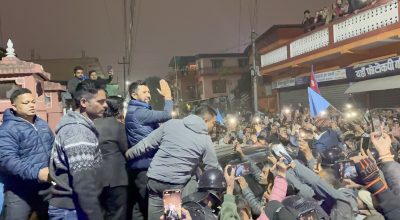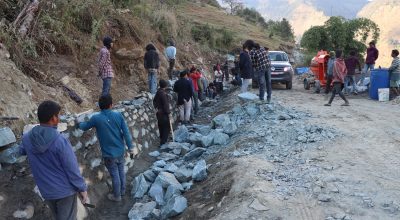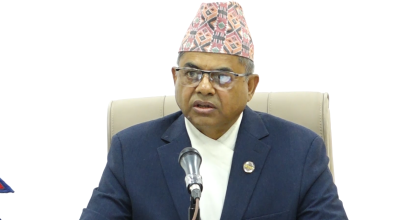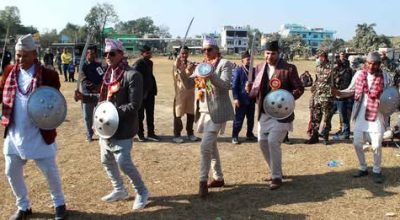
Kathmandu, Feb 16: A 10th-grade girl at a school in Kathmandu spends at least four to five days a week outside the kitchen.
She isolates herself, refrains from participating in religious activities, including worship, and uses separate utensils for eating. The dishes she cleans are not allowed back in the kitchen until they are rewashed by someone else.
A 9th-grade male student observes his mother refraining from religious practices each month. She does not cook during this time.
Another male student from the same class notices his mother staying away from the kitchen and the puja room (a space for family worship rituals). She stops performing any religious activities.
A female student does not touch male family members, refrains from touching religious books, and does not enter the kitchen or visit temples. She also sleeps on the floor.
These are the findings of a recent research shared by the Radha Paudel Foundation.
These findings flatly suggest the discrimination that each person faces during menstruation regularly.
They are continued to being passed on a new generation. Moreover, they are a testament that menstrual discrimination is not “rural-centric” as it is perceived but entrenched in core city life as well. For a large section of society, these practices may seem normal and might have been internalized.
However, for rights activists, these discriminatory practices are ubiquitous, annoying, and significant hurdles to the improvement of human rights.
The Global South Coalition for Dignified Menstruation (GSCDM) has described menstrual discrimination as an umbrella term that includes silence, taboos, shame, stigma, restrictions, abuses, violence, and deprivation from services and resources associated with menstruation throughout the lifecycle of menstruation.
The Coalition has recently submitted its views as a shadow report regarding the review of the status of the implementation of the Convention on the Elimination of All Forms of Discrimination against Women (CEDAW) 1979, which is considered a blueprint in the advancement of women’s rights globally.
The review process is underway in the 90th CEDAW Session (February 3-21). This time, the Democratic Republic of the Congo, Nepal, Belarus, Luxembourg, Belize, Congo, Sri Lanka, and Liechtenstein are scheduled for review at the CEDAW Session.
The session is also set to hold a half-day of general discussion on Gender Stereotypes on Monday, February 17, from 15:00 to 18:00 (Geneva time).
The Coalition has presented its submissions claiming that menstrual discrimination is an underlying cause of gender stereotypes, systemic inequalities, and patriarchal power structures.
As the Coalition claimed in the document, globally, menstruation is seen as ‘dirty,’ ‘impure,’ and a state of weakness, with various forms, names, and magnitudes, transcending all socio-political boundaries, regardless of geography, education, ethnicity, race, faith, or economic status.
The depth of this phenomenon is reflected in its linguistic presence alone—with over 5,000 euphemistic expressions documented globally. In Asia, certain communities enforce menstrual seclusion, food restrictions, and restrict participation in public activities, including religious activities.
In North America and Australia, menstruators reported decreased participation in the workplace and professional activities, along with reduced concentration during menstruation due to the internalized shame and anxiety about maintaining secrecy around their menstrual status and subsequent teasing, as stated in the report.
Similarly, in European countries like Germany, menstruators also express shame about purchasing menstrual products and feel restricted in their participation in routine domestic and academic activities.
Even in Nordic countries, traditionally associated with greater gender equality, menstruators report modifying their daily routines, avoiding physical activities, and experiencing heightened consciousness about their clothing choices during menstruation.
Across various African regions, menstruators face restrictions related to food consumption, bathing practices, harvesting crops, vegetable collection, water source access, etc.
The Coalition’s research findings show that many communities also impose limitations on using shared water sources, toilets, and participating in religious activities. In Latin America, discriminatory beliefs lead to dietary restrictions during menstruation, including prohibitions on milk products, pork, and avocado, along with restrictions on interaction with plants.
Additionally, menstruators report experiencing seclusion from domestic activities, restriction on sun exposure, and limited social engagement.
The Coalition’s understanding is that menstruation functions as a biological tribal marker that has been historically weaponized to create social hierarchies.
Through this lens, menstruators have been systematically categorized as weaker, inferior, and impure compared to non-menstruators, who are positioned as superior due to their absence of menstruation.
“This categorization extends beyond simple biological differences to serve as a fundamental element of gender-based stereotypes across cultures, communities, and institutions. This false narrative and isolated discriminatory practices manifest through a sophisticated network of socio-political controls, ranging from visible explicit violence to invisible forms of violence, all working to construct and maintain an unequal dynamic between menstruators and non-menstruators,” the Coalition argues.
Through the submission, it has recommended the UN Committee to redefine menstrual discrimination from “Traditional Harmful Practices.” It should not be understood as the same as “Traditional Harmful Practices” like son preference, dowry, accusations of witchcraft, and genital mutilation, it asserts.
“Instead, it must be understood as manifestations that directly and indirectly emerge from and are reinforced by underlying menstrual discriminatory practices and beliefs. There should be a primary, independent, and systematic theme within the CEDAW framework to eliminate it, acknowledging it as a root cause rather than a parallel practice,” according to the Coalition.
Furthermore, the term Chhaupadi must be redefined as a term that simply means menstruation in the local Achhami language in Nepal. It must not be understood and explained as the ‘comprehensive term’ to paint the picture of menstrual discrimination, the document strongly suggests the UN Committee. #mensturation












